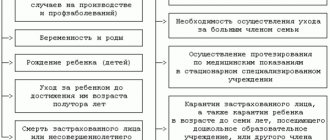Making a deposit when renting an apartment is a fairly common practice when concluding a formal contract. The deposit is a kind of guarantee for the owner of the property in its integrity and safety.
Dear readers!
Our articles talk about typical ways to resolve legal issues, but each case is unique. If you want to find out how to solve your particular problem, please use the online consultant form on the right or call.
It's fast and free! If the agreement is correctly drawn up, this amount is returned to the tenant after the termination of business relations with the owner of the property and is in no way a deposit or the amount of payment for several months in advance.
Security deposit - what is it?
The security deposit is not a deposit and does not represent payment for the last month of rent. This instrument is called differently: security deposit, security payment. But there are significant differences between a security deposit and a prepayment or security deposit, and if this difference is not understood, there may be conflicts at the end of the lease.
The essence of the security deposit is that the tenant credits the landlord's account with the amount agreed upon by the parties. This payment provides coverage for possible damage to the rental property. The security deposit is a refundable amount; it cannot be used as payment for the last month and is not related to the rental deposit.
This fee covers damage to the property if such damage is discovered at the end of the annual contract. When drawing up an acceptance certificate, the owner inspects the apartment, determining whether everything is in order with the furniture and the state of repairs, with payment of telephone bills, etc. At the same time, the necessary costs for bringing the apartment to its original form are estimated. These costs are deducted from the amount of the security deposit, and the remainder of the amount is returned to the tenant by the owner. If the property was not damaged and there was no damage, the full amount of the security deposit is returned to the tenant. The purpose of this deposit is to protect the interests of the property owner.
This type of payment can be called a security payment: with its help, the tenant’s obligation to carefully handle the property is ensured. Calculating the amount of damage is up to the owner, who does not always accurately estimate losses. It is common practice to charge one month's rent for damage.
The procedure for renting private residential premises depends on the conditions agreed upon by the owner and the tenant. At a time when citizens were actively moving to work in large cities, a tradition arose of taking a security deposit from temporary residents.
What is a deposit when renting an apartment? What to consider when applying for a security deposit
Another point to consider is the normal wear and tear of property and renovations. Sometimes tenants are blamed for such changes, resulting in tense conflicts. But if you pay attention to the civil code, you will notice that the apartment owner has no right to demand financial compensation for natural wear and tear.
We recommend reading: How much does a policy cost for a newborn?
The issue of issuing a security payment must be resolved competently. Therefore, upon receipt of funds corresponding to the amount of the security deposit according to the agreement, the apartment owner must write a receipt stating that the money was transferred. This will save both the tenant and the homeowner from possible unpleasant nuances associated with paying the deposit.
What is a security deposit when renting an apartment, why is it needed?
The landlord transfers not only the premises. Usually the apartment has cosmetic repairs, plumbing, household appliances, various furniture, and so on. All this property has a certain service life, and the owner wants to keep it in a usable condition.
The tenant is obliged to take care of the things in the rented apartment.
But not every person succeeds. If an accident occurs and the tenant breaks something, he will have to pay for the damage caused.
It can be difficult to collect anything under a writ of execution from unscrupulous tenants. The debtor will move to another city, rent an apartment again and get an unofficial job. Then compensation for harm will take years.
A security deposit when renting an apartment is a certain amount of money that is transferred to the landlord as a guarantee of compensation for possible damage to his property.
Apartment owners use such deposits to avoid disputes, litigation and possible communication with bailiffs.
Security deposit - what is it?
The Civil Code of the Russian Federation in Article 381.1 reflects the concept of a security payment. One party to the transaction assumes certain responsibilities and contributes money to cover the losses of the other party in case of failure to fulfill the terms of the contract.
When renting an apartment, several people can apply for one room. In this case, the moment of concluding the contract and the moving date may be separated by weeks.
A security deposit is the amount of money that is paid to confirm the intention to rent an apartment when signing a contract.
If a citizen refuses to move and use housing, he will lose money.
Sometimes a security deposit is used as insurance against late rent payments. If a month has already passed and the tenant has not transferred the money, then the resulting penalty can be covered from the deposit.
Security deposit and security deposit when renting an apartment - what is it?
What is a rental deposit? A security deposit, also known as a security payment , implies an amount of money approved by both parties to the transaction, paid by the tenant as a guarantee of compensation for possible losses in the event of damage to the landlord’s property.
However, by mutual agreement of the parties, at the end of the rental period, the security deposit can be used to reimburse the cost of repairs/cleaning (for example, if the tenants leave earlier than the period stipulated in the contract), just as the insurance deposit can be used to pay for the last month of residence .
What is a deposit when renting an apartment?
Do you need help? Consult our lawyer for free!
Laws in our country change very often! Get the latest information by phone!
Just call from any region of Russia:
Or contact our online consultant!
A pledge in civil law is property that secures an obligation.
⇒ When renting housing, this term is used to refer to a sum of money.
The rental deposit for an apartment is set for many cases:
- early termination of the contract;
- damage to property;
- late payment of utilities;
- violation of the rules for using residential premises;
- late payment of rent;
- different case.
It is also worth noting that the deposit can also be set for the owner of the apartment. For example, the owner must return the cost of a month's rent if he has violated his obligations under the contract. This may be a visit to the apartment without the tenant’s knowledge at an unspecified time.
Security deposit when renting an apartment
The deposit amount when renting an apartment directly depends on the amount of rent and the quality of housing.
If we are talking about a payment to cover possible debts on utility services, then its size will be very small.
Typically this is a payment equal to the cost of a month of living in an apartment. When renting housing in the capital in a prestigious area and for a long period, the payment amount can be 2-3 rents.
Apartment rental agreement with a deposit
The agreement must contain the following information:
- document name, date and number;
- information about the parties (full name, series and passport number);
- information about the subject of the agreement (address of the apartment, number of rooms, basis on which the landlord disposes of the premises);
- rights of the landlord (receive payment, periodically check the condition of the apartment, etc.)
- obligations of the landlord (to provide premises in accordance with the requirements of sanitary and epidemiological standards);
- rights of the tenant (to use the premises for their intended purpose);
- responsibilities of the tenant (take care of the landlord’s property, pay rent and utilities on time, etc.);
- procedure for making payments (amount, terms and method of making payments);
- liability (the procedure for collecting a fine or penalty if one of the parties violates its obligations)
- the procedure for posting bail and cases of its use;
- other conditions (term of agreement, number of copies, procedure for termination and extension, etc.);
- signatures of the parties indicating full name. and residential addresses.
The form of the agreement must be in writing.
Residential rental agreements. ⇐
Features of a security deposit when renting an apartment
- living space area;
- market value of the apartment;
- funds spent on repairs;
- floor and total number of floors of the apartment building;
- territorial location;
- infrastructure;
- general condition of the house, entrance;
- the presence or absence of a security alarm, parking, etc.
- the tenant transfers funds to the lessor by receipt;
- the latter pays a visit to a credit institution and opens a special deposit - non-replenishable, without the possibility of partial withdrawal of funds, with interest paid at the end of the term;
- the deposit term is chosen equal to the rental period;
- at the end of the lease term and in the absence of mutual claims, the lessor pays a visit to the banking organization and withdraws money along with interest;
- according to another receipt, the money is transferred back to the tenant.
Is the deposit amount refunded?
The law considers various security deposits as a tool to secure the obligations of one of the parties. And it can only be used in strictly specified situations.
A deposit for an apartment when renting an apartment cannot be both an advance payment for the last month of residence and security in case of property damage.
In practice, the vast majority of landlords consider all transferred money as their own. Apartment owners try not to return deposits under various pretexts.
Insurance deposit
A little history: 3-5 years ago, a deposit when renting an apartment was not so popular and apartment owners did without it. To move in, you had to pay a month in advance and verbally promise that everything would be fine. Time passed, unscrupulous employers allowed themselves not to pay on time, break household appliances without compensation for damage, or simply disappear in an unknown direction, throwing the keys in the mailbox.
A rental security deposit is needed to ensure the safety of the property transferred to the Tenant, a guarantor of payment for apartment maintenance services - water supply, electricity and other paid services, including telephone and Internet. Compensation for potential damage caused.
Advantages and disadvantages of renting an apartment with a security deposit
The owner of the apartment who has received the deposit guarantees himself against many risks. From this amount you can cover debts on utility bills, the cost of wallpaper, repairs of household appliances, pay for professional cleaning services, and so on. However, this significantly narrows the circle of applicants for rent.
Thanks to the security deposit, the tenant can count on renting a new apartment with appropriate repairs.
The disadvantages are obvious: you have to deposit a large amount at once, and returning it can be a problem.
How to apply for a security deposit, contract requirements
If the parties agree to pay a deposit, then this should be formalized as a separate clause in the contract.
The agreement must contain the following provisions:
- deposit size;
- procedure and terms of payment;
- method of storing money (in a bank account or with the apartment owner);
- cases when the amount is used to cover losses or penalties;
- return procedure and terms.
When a deposit payment is made, the conclusion of the contract must be accompanied by the signing of an act of acceptance and transfer of property. It is also advisable to include in the rental agreement for an apartment with a deposit an inventory of the property indicating the approximate cost.
What is a security deposit when renting an apartment?
In addition, unscrupulous renters can take advantage of one more point. Article 622 of the Civil Code of Russia states that the item is returned in the same condition to the owner, but taking into account normal wear and tear. Its presence is not the basis for compensation for the item using a deposit. For example:
Since the legal mechanism for transferring a deposit is not regulated by law, the creation of a written document will not be required. All issues related to the deposit are specified in a separate provision in the lease agreement (see Tips for drawing up an apartment lease agreement). The existence of a lease agreement is necessary to consolidate the powers of the parties in lease legal relations in order to protect the interests of each of the participants.
Refund of deposit under rental agreement
Landlords are extremely reluctant to return money to their tenants at the end of the contract.
As a rule, the tenant notifies the apartment owner about his move within a month. In order not to return the deposit under the lease agreement, the owner offers to offset this money as a fee for using the apartment.
Some homeowners try to reduce the amount to be returned by any means. They indicate scuffs on the wallpaper, faded upholstery of upholstered furniture, and fresh scratches on household appliances. And they demand compensation for harm.
You need to remember the natural wear and tear of things during use. And about the decrease in the value of property with its constant use. All this affects the amount of damage caused.
If a dispute arises about the amount of damage caused, the parties will have to settle it in court.
Security deposit under the rental agreement
Some agencies take a slightly different approach to such a tool for compensating possible damages. We are talking about a scheme in which such a deposit is not considered as a security deposit or an advance payment for the last month of rent.
This money cannot be used to pay rent; its only purpose is to guarantee the financial security of the apartment owner in the event of damage to his property by tenants. Therefore, when understanding what a deposit is when renting an apartment, it is worth taking into account this approach to the rental process.
The landlord does not return the deposit - what to do?
If the landlord does not return the deposit, the tenant should send a written, motivated complaint.
The letter must indicate the illegality of such behavior, indicate the deadline for returning the money and the desired method of receiving it.
If this does not produce results, then all that remains is to go to court. The dispute will quickly be resolved in favor of the plaintiff if the defendant does not provide evidence of damage to him.
You definitely shouldn’t damage the property of the apartment owner, take his things, or commit other illegal actions.
The tenant and landlord should act in good faith and with respect towards each other. A detailed agreement and a deposit cannot completely eliminate all possible conflict situations.
The Civil Code of the Russian Federation, which fully regulates the procedure for transferring living space for temporary use, also defines such a concept as a security deposit when renting an apartment. It represents a certain guarantee and protection for the owner of a property regarding the risk of harm to his property. The deposit will also help if the tenant evades paying utilities and other obligations.
Such a concept as a deposit when renting an apartment is not fully reflected in the current Russian legislation. It exists solely in connection with the rules of business transactions in certain areas of activity. That is, when concluding an agreement, the owner of the apartment can put forward a requirement for the payment of a certain guaranteed amount of money. This is due to possible damage to the homeowner, that is, damage to household appliances, furniture and the premises itself.
Dear readers!
Our articles talk about typical ways to resolve legal issues, but each case is unique. If you want to find out how to solve your specific problem, please contact the online consultant form on the right →
It's fast and free!
Or call us by phone (24/7):
Why not bail?
Many people confuse a security deposit with a pledge, but in legal terms these two concepts are significantly different from each other. A deposit is a certain agreed amount that the tenant transfers to the owner of the apartment in order to confirm the seriousness of his intentions, which is analogous to booking a property. The deposit is transferred at the time of signing the rental agreement and is equal to one month's rent in the same way as the security deposit.
A security deposit is an amount that will be used to compensate the owner of the apartment if the tenant causes damage to his property. It is not advisable to pay such a deposit only if the tenant is renting part of the apartment, and the owner will live there. That is, if a room is rented with an owner. In this case, the owner will have the opportunity to control the actions of the tenant, the condition of the property and demand timely compensation. Depending on the amount of damage caused, the payment can be divided into several months. But whatever agreement the parties ultimately reach, all this must be spelled out in the lease agreement.
Transfer by agreement
Execution of a separate document regarding the payment of a security deposit when renting an apartment is not required, since it is not regulated in any way by legislative regulations. All clauses of the agreement concerning its introduction must be spelled out in the text of the lease agreement itself. If a transaction is concluded without drawing up an agreement, then neither party will be protected either from fraudulent activities or from the dishonesty of the other party, so they will not be able to demand anything from each other.
A transaction involving the transfer of an apartment for temporary use at the legislative level requires:
Receipt of a sum of money can be recorded using a receipt or an act of acceptance and receipt of money.
Design rules
A deposit when concluding an apartment rental transaction is a guarantee of the parties’ honesty, which is included in the contract. The clear amount of the deposit made is recorded in it digitally and verbally. If the transaction is concluded with the help of a realtor, then he also acts as a guarantor and signs the document. This obliges him to take part in further conflicts between the parties that may arise regarding damage to property, payment or return of the deposit amount. However, this is already included in the cost of realtor services.
Transfer of the deposit amount can be carried out in cash or through a bank. The second option is advantageous, since the fact of payment will be confirmed by a receipt and the bank. When paying in cash, the owner of the apartment must personally or between the parties an act of acceptance and transfer of these funds must be drawn up. It is advisable to record the fact of payment in the contract itself.
What is a deposit when renting an apartment, why is it needed?
Despite the fact that all rented apartments and their owners are different, in practice there are certain rules for providing housing for rent. Upon moving in, residents are immediately charged for their accommodation for a month in advance.
Many people ask to pay the same amount as a security deposit. It is designed to compensate for the possible expenses of the homeowner in the event of property damage by residents, their failure to pay rent and utilities, or flooding of neighbors.
After all, there are many cases when residents move out without warning, leaving behind dirt, damaged things, and debts for utilities.
In practice, certain rules have emerged for the provision of housing for rent.
Therefore, people renting housing prefer to insure themselves in case of tenants' dishonesty. In contracts, such payment is usually referred to as a security deposit or security deposit.
The legislation does not contain a specific rule providing for the payment of a deposit when renting a home. However, in fact, the payment of this amount ensures the fulfillment of the obligations existing when renting an apartment.
According to the Civil Code of the Russian Federation, when concluding a transaction, the parties have the right to independently choose the method of securing it. The Code provides for the possibility of one of the parties to a transaction making a security payment in favor of the other in the event of its violation, including in the future.
As a rule, in contracts, tenants undertake to provide:
- safety of the housing itself and the property located in it;
- payment for housing and communal services;
- payment of rental fees.
Common mistakes
Often the deposit is used as rent for the last month of living in an apartment. This is not scary for the tenant, but the owner of the property is threatened with the fact that he will receive payment for the last month, and no one will compensate for the damage caused to him due to his own fault. Some tenants may refer to the Civil Code, which states that property rented out for use must be returned to the owner in a condition that takes into account normal wear and tear, that is, they do not admit their guilt and refuse compensation, explaining all this as normal wear and tear.
Errors that occur when returning and processing warranty funds
A common mistake made by the owner is to indicate in the contract that the security amount can be used instead of the last month's payment. Thus, he deprives himself of the guarantee of the safety of his acquired property. Therefore, this situation should be avoided. The owner simply will not be able to compensate for the costs of the damage caused, if, of course, this happens.
Property owners can not only suffer, but also harm the client’s financial situation themselves by keeping silent about one important circumstance. The fact is that a tenant who is ignorant of the legal field may not know that things must be returned after the period of use in an unchanged condition, taking into account natural wear and tear.
And it involves some changes in the appearance of the property left for use. The following cases are not risks covered by the security deposit:
- marks on household appliances after use;
- minor abrasions on wallpaper surfaces;
- expensive curtains or furniture faded in the sun;
- carpet aged from use and much more.
These situations exclude the requirement of funds to cover “damage”. Moreover, they do not have the right to ask for payment in case of delivery of empty meters, without furnishings and household contents.









